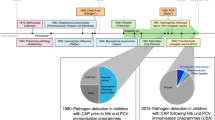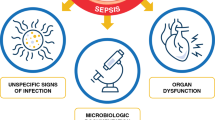Abstract.
A prospective observational study was done to derive performance characteristics for the Glasgow Meningococcal Septicaemia Prognostic Score (GMSPS) and compare it with nine other severity scores (Stokland, Stiehm and Damrosch, Ansari, Niklasson, Leclerc, Kahn and Blum, Lewis, Istanbul and Bjark) and laboratory markers of disease severity. In the paediatric departments of six hospitals in Merseyside, UK, 278 children with confirmed or probable meningococcal disease were admitted between November 1988 and August 1990 (n=152) and between September 1992 and April 1994 (n=126); 26 of whom died. GMSPS was recorded on admission and again if there was clinical deterioration. Laboratory markers of disease severity (including endotoxin and cytokine levels) were measured on admission. The nine other scores were recorded on the first cohort. "Maximum" GMSPS (before referral to the paediatric intensive care unit) was achieved within 12 h of arrival in 97% of children. A GMSPS ≥8 had sensitivity 100%, specificity 75% and positive predictive value for death of 29%, GMSPS ≥10 had 100%, 88% and 46% respectively. All 26 who died scored >10, before referral to the paediatric intensive care unit. GMSPSs calculated by other medical staff had similar characteristics to those calculated by research fellows. All scores correlated significantly with white cell count, coagulopathy, endotoxin and cytokine levels. However, the predominantly clinical scores were the most robust. GMSPS had amongst the best performance characteristics of all scores and was more sensitive than laboratory markers. Conclusion: the Glasgow Menigoccocal Septicaemia Prognostic Score is an easily performed, repeatable, clinical score that can rapidly identify children with fulminant meningococcal disease. When performed prospectively, a score ≥8 had a positive predictive value for death of 29%. This score can identify those children who should be offered intensive care and can select those who may benefit from novel therapies.
Similar content being viewed by others
Author information
Authors and Affiliations
Additional information
Electronic Publication
Rights and permissions
About this article
Cite this article
Riordan, A.F., Marzouk, O., Thomson, A.P. et al. Prospective validation of the Glasgow Meningococcal Septicaemia Prognostic Score. Comparison with other scoring methods. Eur J Pediatr 161, 531–537 (2002). https://doi.org/10.1007/s00431-002-1024-7
Received:
Accepted:
Published:
Issue Date:
DOI: https://doi.org/10.1007/s00431-002-1024-7




